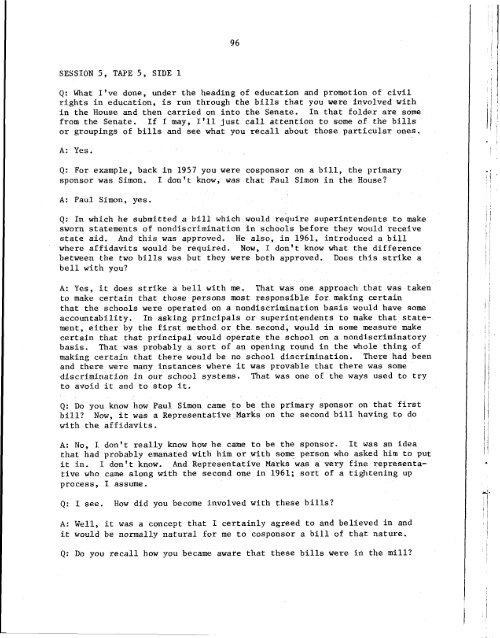Cecil A. Partee Memoir - University of Illinois Springfield
Cecil A. Partee Memoir - University of Illinois Springfield
Cecil A. Partee Memoir - University of Illinois Springfield
You also want an ePaper? Increase the reach of your titles
YUMPU automatically turns print PDFs into web optimized ePapers that Google loves.
SESSION 5, TAPE 5, SIDE 1<br />
Q: What I've done, under the heading <strong>of</strong> education and promotion <strong>of</strong> civil<br />
rights in education, is run through the bills that you were involved with<br />
in the House and then carried on into the Senate. In that folder are some<br />
from the Senate. If 1 may, I'll just call attention to some <strong>of</strong> the bills<br />
or groupings <strong>of</strong> bills and see what you recall about those particular ones.<br />
A: Yes.<br />
Q: For example, back in 1957 you were cosponsor on a bill, the primary<br />
sponsor was Simon. I dnn't know, was that Paul Simon in the House?<br />
A: Paul Simon, yes.<br />
Q: In which he submitted a bill which would require superintendents to make<br />
sworn statements <strong>of</strong> nondiscrimination in schools before they would receive<br />
state aid. And this was approved. He also, in 1961, introduced a bill<br />
where affidavits would be required. Now, I don't know what the difference<br />
between the two bills was but they were both approved. Does this strike a<br />
bell with you?<br />
A: Yes, it does strike a bell with me. That was one approach that was taken<br />
to make certain that those persons most responsible for making certain<br />
that the schools were operated on a nondiscrimination basis would have some<br />
accountability. In asking principals ar superintendents to make that statement,<br />
either by the first method or the second, would in some measure make<br />
certain that that principal would operate the school on a nondiscriminatory<br />
basis. That was probably a sort <strong>of</strong> an opening round in the whole thing <strong>of</strong><br />
making certain that there would be no school discrimination. There had been<br />
and there were many instances where it was provable that there was some<br />
discrimination in our school systems. That was one <strong>of</strong> the ways used to try<br />
to avoid it and to stop it.<br />
Q: Do you know how Paul Simon came to be the primary sponsor on that first<br />
bill? Now, it was a Representative Marks on the second bill having t~ do<br />
with the affidavits.<br />
A: No, I. don't really know how he came to be the sponsor. It was an idea<br />
that had probably emanated with him or with some person who asked him to put<br />
it in. I don't know. And Representative Marks was a very fine representative<br />
who came along with the second one in 1961; sort <strong>of</strong> a tightening up<br />
process, I assume.<br />
Q: I see. How did you become involved with these bills?<br />
A: Well, it was a concept that I certainly agreed to and believed in and<br />
it would be normally natural for me to cosponsor a bill <strong>of</strong> that nature.<br />
Q: Do you recall how you became aware that these bills were in the mill?
















